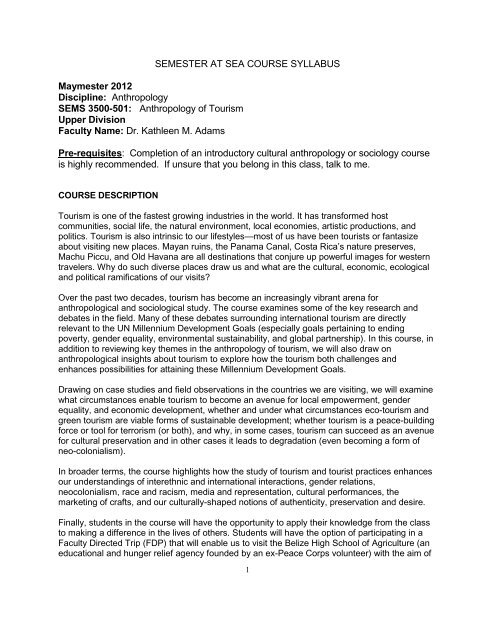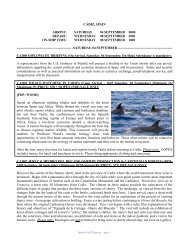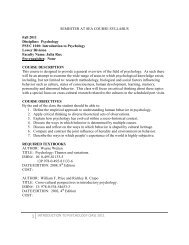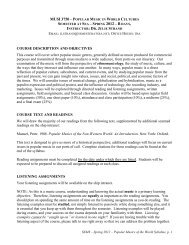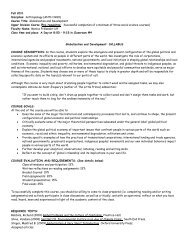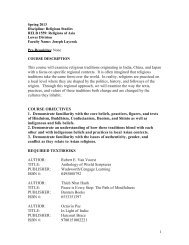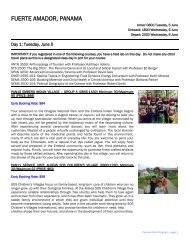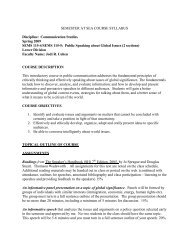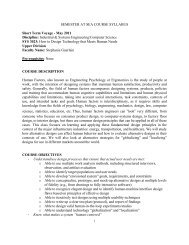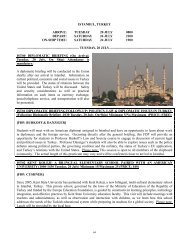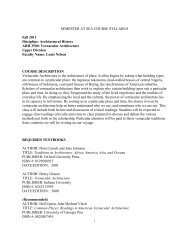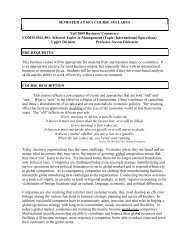ANTH 3559 - University of Virginia
ANTH 3559 - University of Virginia
ANTH 3559 - University of Virginia
You also want an ePaper? Increase the reach of your titles
YUMPU automatically turns print PDFs into web optimized ePapers that Google loves.
Maymester 2012<br />
Discipline: Anthropology<br />
SEMS 3500-501: Anthropology <strong>of</strong> Tourism<br />
Upper Division<br />
Faculty Name: Dr. Kathleen M. Adams<br />
SEMESTER AT SEA COURSE SYLLABUS<br />
Pre-requisites: Completion <strong>of</strong> an introductory cultural anthropology or sociology course<br />
is highly recommended. If unsure that you belong in this class, talk to me.<br />
COURSE DESCRIPTION<br />
Tourism is one <strong>of</strong> the fastest growing industries in the world. It has transformed host<br />
communities, social life, the natural environment, local economies, artistic productions, and<br />
politics. Tourism is also intrinsic to our lifestyles—most <strong>of</strong> us have been tourists or fantasize<br />
about visiting new places. Mayan ruins, the Panama Canal, Costa Rica’s nature preserves,<br />
Machu Piccu, and Old Havana are all destinations that conjure up powerful images for western<br />
travelers. Why do such diverse places draw us and what are the cultural, economic, ecological<br />
and political ramifications <strong>of</strong> our visits?<br />
Over the past two decades, tourism has become an increasingly vibrant arena for<br />
anthropological and sociological study. The course examines some <strong>of</strong> the key research and<br />
debates in the field. Many <strong>of</strong> these debates surrounding international tourism are directly<br />
relevant to the UN Millennium Development Goals (especially goals pertaining to ending<br />
poverty, gender equality, environmental sustainability, and global partnership). In this course, in<br />
addition to reviewing key themes in the anthropology <strong>of</strong> tourism, we will also draw on<br />
anthropological insights about tourism to explore how the tourism both challenges and<br />
enhances possibilities for attaining these Millennium Development Goals.<br />
Drawing on case studies and field observations in the countries we are visiting, we will examine<br />
what circumstances enable tourism to become an avenue for local empowerment, gender<br />
equality, and economic development, whether and under what circumstances eco-tourism and<br />
green tourism are viable forms <strong>of</strong> sustainable development; whether tourism is a peace-building<br />
force or tool for terrorism (or both), and why, in some cases, tourism can succeed as an avenue<br />
for cultural preservation and in other cases it leads to degradation (even becoming a form <strong>of</strong><br />
neo-colonialism).<br />
In broader terms, the course highlights how the study <strong>of</strong> tourism and tourist practices enhances<br />
our understandings <strong>of</strong> interethnic and international interactions, gender relations,<br />
neocolonialism, race and racism, media and representation, cultural performances, the<br />
marketing <strong>of</strong> crafts, and our culturally-shaped notions <strong>of</strong> authenticity, preservation and desire.<br />
Finally, students in the course will have the opportunity to apply their knowledge from the class<br />
to making a difference in the lives <strong>of</strong> others. Students will have the option <strong>of</strong> participating in a<br />
Faculty Directed Trip (FDP) that will enable us to visit the Belize High School <strong>of</strong> Agriculture (an<br />
educational and hunger relief agency founded by an ex-Peace Corps volunteer) with the aim <strong>of</strong><br />
1
developing a plan for how the school might become a pro-poor tourism destination. (For more<br />
information on the school, see A School for Others: The History <strong>of</strong> the Belize High School <strong>of</strong><br />
Agriculture, by George Lebard).<br />
Grades will be based on 3 quizzes (lowest score dropped), write-up <strong>of</strong> FDP (to be fully explained<br />
in class), a final exam and class discussion and participation.<br />
COURSE OBJECTIVES<br />
You should come away from this seminar with the following abilities:<br />
-to discuss tourism as it relates to contemporary globalization<br />
-to appreciate the potentialities <strong>of</strong> tourism for global partnerships for development<br />
(Millennium Development Goal #8).<br />
-to understand the role <strong>of</strong> tourism in politics, including tourism’s relation to national<br />
economic development, nation-building and even war and peace (all relevant to<br />
Millennium Development Goal # 1: Eradicating poverty and hunger).<br />
-to discuss the key authors and theories in the anthropology <strong>of</strong> tourism<br />
-to understand the types <strong>of</strong> ecological transformations resulting from tourism<br />
development and their ramifications for local communities (including debates<br />
surrounding tourism as sustainable development, agritourism & “green tourism”)<br />
(relevant to Millennium Development Goal # 7: Achieving environmental<br />
sustainability)<br />
-to appreciate tourism’s role in creating cultural/ethnic/gender imagery & stereotypes, as<br />
well as its potential to foster both gender inequity and gender equality<br />
(Millennium Development Goal # 3)…also to understand tourism’s role in the<br />
spread <strong>of</strong> HIV (relevant to Millennium Development Goal #6: Combat HIV/AIDs).<br />
-to examine the ethical challenges and potentialities <strong>of</strong> dark tourism, poverty tourism and<br />
“pro-poor” tourism (relevant to Milleniun Development Goal # 1).<br />
-to recognize subtle messages (espe re gender and ethnic identities) embedded in<br />
tourism materials (arts/souvenirs, brochures, performances etc.)<br />
-to discuss ways in which museums and other cultural heritage sites are sites for the<br />
transmission and negotiation <strong>of</strong> particular cultural values and visions (for both<br />
citizens and visitors)<br />
-to apply tourism theories to actual case studies in the countries we are visiting<br />
-enhanced written and verbal communication skills<br />
REQUIRED TEXTBOOKS<br />
AUTHOR: Sharon Gmelch (editor)<br />
TITLE: Tourists and Tourism: A Reader (2 nd edition)<br />
PUBLISHER: Waveland (Long Grove, IL)<br />
ISBN #: 978-1-57766-636-3<br />
DATE/EDITION: 2 nd edition<br />
AUTHOR: Jamaica Kincaid<br />
TITLE: A Small Place<br />
PUBLISHER: Penguin Books<br />
2
ISBN:#: 0-452-26235-6<br />
Edition: Latest<br />
-Additional electronic readings in course folder<br />
TOPICAL OUTLINE OF COURSE<br />
All readings should be done prior to the class on the day they are listed.<br />
Day 1- Orienting Tour: The Sociocultural Study <strong>of</strong> Tourism<br />
Course overview, administrative details; the relevance <strong>of</strong> tourism to millennium development<br />
goals and Latin American visions for the future (ex Plan Puebla Panama), Travel-writing<br />
exercise.(Also Intro to the anthrpology <strong>of</strong> tourism as a field <strong>of</strong> study: Roots <strong>of</strong> Contemporary<br />
Tourism Patterns; A Whirlwind History <strong>of</strong> Tourism; Classic theories about why we travel; Defining<br />
“the tourist”: Classic tourist typologies & their limitations; Parallels between pilgrimage &<br />
tourism; Sightseeing as modern ritual/sacred quest).<br />
Read for Day 1 (prior to class): -Gmelch, S. “Why Tourism Matters” Ch 1 Tourists and Tourism.<br />
-Graburn, N. “Secular Ritual: A General Theory <strong>of</strong> Tourism.” Ch 2 Tourists and Tourism.<br />
(read this as an avenue for reflecting on our own practices as tourists, since it is<br />
important to understand Western tourists’ mindsets, as well)<br />
-Begin reading the next session’s readings, as they are longer.<br />
-In class video segment: “Holi-days” (2002, Tell-Tale Productions)<br />
Day 2: Shaping Meaning and Making Money: Tourism, Authenticity and Marketing <strong>of</strong><br />
Images <strong>of</strong> Peoples and Places<br />
A. Anthropological debates concerning authenticity and travelers’ pursuits (MacCannell’s “staged<br />
authenticity”, post-tourism, meta-tourism, the “questioning gaze,” McDisneyization, hypo-reality),<br />
looking beyond authenticity: are there other more productive approaches to understanding<br />
dynamics in tourist spaces?<br />
B. Economic dimensions <strong>of</strong> tourism. Cultural commoditization, leakage, tourism’s links to global<br />
economic restructuring. The relevance <strong>of</strong> tourism to the economic aspects <strong>of</strong> the UN Millennium<br />
goals.<br />
Read: - McLaren, Deborah “Tourism and Globalization” (4. Pp) (in class folder)<br />
-Ingles, P. “Performing Traditional Dances for Modern Tourists in the Amazon” Ch 13 in<br />
Tourists and Tourism. (Case study <strong>of</strong> Peru and Ecuador)<br />
-Mowforth, Charlton and Munt “Ch 5: Indigenous Peoples and Tourism in Latin America<br />
and the Caribbean” in Tourism and Responsibility: Perspectives from Latin<br />
America and the Caribbean, edited by Mowforth, Charlton and Munt. (2008)<br />
NY: Routledge. Read pp. 137-150, 152-159 top, p. 160 (bottom) – end <strong>of</strong> chapter.<br />
Optional Readings & Resources:<br />
-Highly recommended: “Ch 1: Introduction” & Ch 2 “Global Politics, Power and Play: The<br />
Macro-Level <strong>of</strong> Responsibility” in Tourism and Responsibility: Perspectives from Latin<br />
American and the Caribbean ed. By Martin Mowforth, Clive Charlton and Ian Munt (2008).<br />
-G. Ritzer & Allan Liska “McDisneyization and Post-Tourism: Complementary<br />
Perspectives on Contemporary Tourism.” (In C. Rojek & J. Urry’s Touring Cultures:<br />
Transformations <strong>of</strong> Travel and Theory (1997) London: Routledge.<br />
3
-Azarya, V. (2004) Globalization and International Tourism in Developing Countries:<br />
Marginality as a Commercial Commodity 52(6): 949-967.<br />
-Morgan & Pritchard “On Souvenirs & Metonymy: Narratives <strong>of</strong> Memory,<br />
Metaphor, & Materiality” Tourist Studies 2005 (5) 29:29-53. (In course folder)<br />
-Hazel Tucker “Welcome to Flintstones-land: Contesting Place and Identity in Goreme,<br />
Central Turkey.” In S. Coleman & M. Crang Tourism: Between Place and<br />
Performance (2002) New York: Berghahn Books. Pp. 143-159.<br />
Day 3: Tourism and Identity: Power, Inter-Group Relations, and Inequality<br />
How does tourism transform sensibilities about identity, ethnic relations/hierarchies and race?<br />
How do travelers use tourism for their own identity agendas? Class, “race” and ethnic hierarchies<br />
(& conflicts) in touristic settings; travel and “cultural capital,” tourism and local/indigenous agency;<br />
Foucault-inspired analyses <strong>of</strong> power in tourism settings;<br />
Read:-Stronza, A. “Through a New Mirror: Tourism and Identity in the Amazon” Ch 16, in<br />
Tourists and Tourism. (Case study in Peruvian Amazon)<br />
-van den Berghe, P. (1980) Tourism as Ethnic Relations: A Case Study <strong>of</strong> Cuzco, Peru”<br />
NOTE: This is an older, classic article. For those visiting Cusco, while there,<br />
consider the extent to which relations have changed since the piece appeared.<br />
-Stevens, M. “Power Disparities and Community-Based Tourism in Vietnam” Ch 24 in<br />
Tourists and Tourism. (skim—consider the relevance <strong>of</strong> this study for Latin<br />
American sites)<br />
Additional Optional Readings:<br />
-Do-Min Cheong & Miller, M. “Power and Tourism: A Foucaulian Approach.” Annals <strong>of</strong><br />
Tourism Research (2000) 27(2): 371-90. (course folder)<br />
-Guerron-Montero, C. (2006) “Can't Beat Me Own Drum in Me Own Native Land:<br />
Calypso Music and Tourism in the Panamanian Atlantic Coast.” Anthropological<br />
Quarterly, 79(4).<br />
-Munt, Ian “The Other Post-Modern Tourism: Class, Travel and the New Middle<br />
Classes.” Theory, Culture and Society 1994 11:101-123. (course folder)<br />
Video clips (in class): Paraiso for Sale<br />
Day 4: Tourism and Human Suffering: Tragic Tours, Poverty and Pro-Poor Tourism<br />
Recently, not only have tourists become terrorist targets, but sites <strong>of</strong> death & tragedy have<br />
become increasingly popular tourist destinations. While battlefields and Nazi concentration<br />
camps have long drawn tourists, tours <strong>of</strong> poverty-stricken communities have been on the rise<br />
(e.g. Brazil’s favela tours). In this module we examine the ways in which tourism intersects with<br />
human suffering. We review forms <strong>of</strong> “dark tourism,” explore the draw <strong>of</strong> post-conflict Latin<br />
American nations, and examine the phenomena <strong>of</strong> “pro-poor” and volunteer tourism. Key<br />
concepts: pro-poor tourism; “tourorists”; “danger zone tourists.” In addition, this module<br />
addresses the intersection <strong>of</strong> illness and tourism. We will discuss the ethical issues some <strong>of</strong><br />
these new tourist sites might raise, as well as the extent to which these are viable new<br />
strategies for generating revenues in poorer countries and for achieving Millennium<br />
Development goals #1 (eradicate poverty and hunger) and #8 (global partnerships). We will also<br />
review debates pertaining to pro-poor tourism, examining the extent to which it can serve as a<br />
viable avenue towards attaining UN Millennium Goal # 1, ending poverty and hunger.<br />
4
Read: -Schluter “Heritage Tourism in Latin America: Can Turbulent Times be Overcome?”<br />
-J. Ingram “Volunteer Tourism: How Do We Know It is Making A Difference?”<br />
-Any Latin America or Caribbean country chapter in Robert Young Pelton’s Fielding’s<br />
The World’s Most Dangerous Places (1998) Redondo Beach, Calif.: Fielding<br />
Worldwide Inc. Pp. 349-369. (skim for a feel for the writing and imagery).<br />
Optional Readings & Resources:<br />
-Adams, Kathleen “Danger Zone Tourism: Prospects and Problems for Tourism in<br />
Tumultuous Times” in Worlds: Tourism in Southeast Asia. (2001). Pergamon Press.<br />
-Goodwin, H. “Ch. 5: Measuring and Reporting the Impact <strong>of</strong> Tourism on Poverty” in<br />
Developments in Tourism Research, ed. By Tribe and Airey (2007), Elsevier Ltd.<br />
-Phipps, Peter “Tourists, Terrorists, Death and Value” in R. Kaur and J. Hutnyk (eds.)<br />
Travel Worlds: Journeys in Contemporary Cultural Politics. (1999) Zed Books.<br />
-“Dark Tourism” web site: http://www.dark-tourism.org.uk/<br />
-J. Lennon & M. Foley Dark Tourism (2000) London: Continuum.<br />
-Mowforth, Charlton, & Munt “Ch 6: Urban Tourism: The Heart <strong>of</strong> Darkness?” in Tourism<br />
and Responsibility.<br />
-Wearing and Ponting “Breaking Down the System: How Volunteer Tourism Contributes<br />
to New Ways <strong>of</strong> Viewing Commodified Tourism” in Tazim Jamal & mike Robinson Sage<br />
Handbook <strong>of</strong> Tourism Studies (2009), London: Sage.<br />
-In class video segment from “Can’t Do It In Europe”<br />
Day 5: Part A: Midterm Quiz; Part B: Analyzing Tourism: Methods, Sites, Verbal and<br />
Material Products <strong>of</strong> Tourism<br />
A. Midterm Quiz<br />
B. Analyzing Tourism Narratives, Verbal Representations, Brochures & Travel Trinkets<br />
How do narratives (guides’ verbal presentations about sites, museum labels etc) construct what<br />
the tourist sees and experiences? And what <strong>of</strong> tourists’ narratives about their trips? How do<br />
travel stories contribute to the shaping <strong>of</strong> others’ perceptions <strong>of</strong> destinations and the peoples<br />
residing in those destinations? To the shaping <strong>of</strong> their own identities? Research methods in<br />
tourist sites, narrative analysis, etc. What is the role <strong>of</strong> material culture in defining tourist<br />
destinations? How are tourist arts & tourist desires linked? Tourism, photography and the<br />
meandering gaze, Case study <strong>of</strong> Panama’s Cuna molas (& the economic empowerment <strong>of</strong> ethnic<br />
minorities and indigenous women).<br />
Read: Ylanne-McEwen “Golden Times for Golden Agers: Selling Holidays as Lifestyle<br />
for the Over 50s” (2000, Summer) Journal <strong>of</strong> Communication 50(3):83-99 (Read this<br />
article as an example <strong>of</strong> how to do textual analysis <strong>of</strong> travel agent dialogues with<br />
potential customers. If pressed for time, you can skim some <strong>of</strong> the examples, but be sure<br />
to grasp their methodology and findings). (In course folder)<br />
IMPORTANT: Bring to class: Write a brief 1 to 2 paragraph auto-ethnography on a<br />
photo you have taken or a souvenir you have bought (or, if you prefer, interview a friend<br />
about a souvenir they bought). If possible, bring the souvenir to class. (This will partially<br />
contribute to your participation grade)<br />
5
Optional Readings & Resources:<br />
-Jennings, Gayle “Interviewing: A Focus on Qualitative Techniques” Ch 9 in B.W.<br />
Ritchie, P. Burns & C. Palmer (eds.) Tourism Research Methods: Integrating Theory with<br />
Practice. (2005) Cambridge, MA: CABI Publishing. Pp. 99-117.<br />
-Adams, K. “Come to Tana Toraja, Land <strong>of</strong> the Heavenly Kings: Travel Agents as<br />
Brokers in Ethnicity” Annals <strong>of</strong> Tourism Research, 1984. (An example <strong>of</strong> how to analyze<br />
travel brochures). (In course folder.)<br />
-Morgan & Pritchard “On Souvenirs & Metonymy: Narratives <strong>of</strong> Memory,<br />
Metaphor, & Materiality” Tourist Studies 2005 (5) 29:29-53. (In course folder)<br />
Day 6: - Combined themes re Tourism, Politics & International Relations<br />
A.The Politics <strong>of</strong> Tourism: Tourism, Heritage, History-making & the State<br />
How is tourism used by the state for nation-building and other projects? What role do sites such<br />
as national museums play in this process? How does tourism transform international relations?<br />
Can tourism threaten to undermine a state’s agendas? Can it be drawn upon to further a<br />
nation’s international agendas? Tourism as political weapon/political reward. How can tourism<br />
transform regional relations within a state (e.g. can it play a role in shifting relations between<br />
ethnic groups or religious groups in the same region, etc). (Reflection on these themes in<br />
Cuba). How might tourist sites such as museums be used to foster broader primary education in<br />
impoverished nations (UN Millennium Development goal #2)?<br />
B. Tourism at Sea: Analyzing Cruise Ship Tourism<br />
Ethnic hierarchies at sea, cruise ship industry as a paradigmatic case <strong>of</strong> globalization, cruise<br />
ship dependent ports, environmental issues pertaining to cruise ships (& their ramifications for<br />
local communities/nations), the Fantasy Island phenomenon, etc. How does the cruise ship<br />
industry relate to UN Millennium Development goal #8 (global partnership)?<br />
Read: -Peter M. Sanchez & Kathleen Adams “The Janus-Faced Character <strong>of</strong> Tourism in Cuba.”<br />
Ch 22 in Tourists and Tourism. (Although the Cuba port has been canceled, as<br />
you read this consider the way in which tourism representations intersect with<br />
state agendas in the nations we have visited).<br />
-Guerron-Montero, Carla “The Three Roots <strong>of</strong> Panama’s Cultural Heritage: The<br />
Construction <strong>of</strong> Racial and National Identities in Theme Parks” in Cultural Tourism<br />
in Latin America (2009).<br />
-P. Patullo “Sailing into the Sunset: The Cruise Ship Industry” Ch 21 in Tourists and<br />
Tourism. Note: As you read this, reflect on the extent to which these dynamics<br />
are consistent with or different from our own M.V. Explorer.<br />
Optional Readings:<br />
-Robert Wood “Caribbean Cruise Tourism: Globalization at Sea” Annals <strong>of</strong> Tourism<br />
Research (2000) 27(2): 345-370. (in class folder)<br />
-E. Bruner “Tourism in Ghana: The Representation <strong>of</strong> Slavery and the Return <strong>of</strong> the<br />
Black Diaspora.” Ch 19 in Tourists and Tourism.<br />
-Kathleen Adams “Domestic Tourism and Nation-Building in South Sulawesi, Indonesia”<br />
Indonesia and the Malay World. (1998) 26(75): 77-97.<br />
-D. Light “Dracula Tourism in Romania: Cultural Identity and the State” Annals <strong>of</strong><br />
Tourism Research (2007).<br />
-Robert Wood “Tourism and the State: Ethnic Options and Constructions <strong>of</strong> Otherness”<br />
6
Ch. 1 in Michel Picard and Robert Wood (Eds). Tourism, Ethnicity and the State in Asian<br />
and Pacific Societies. Honolulu: <strong>University</strong> <strong>of</strong> Hawaii Press. (1997) Pp. 1-34.<br />
-Leslie Witz “Transforming Museums on Post-Apartheid Tourist Routes” in I. Karp, C.<br />
Kratz et. al. (eds) Museum Frictions: Public Cultures/Global Transformations (2006)<br />
Durham: Duke Univ. Press. Pp. 107-134.<br />
Day 7: Tourism and Nature: Ecotourism, Nature Parks & Sustainability<br />
What is sustainable tourism? Does ecotourism protect the environment? Eco-tourism or egotourism?;<br />
Butler’s “resort life cycle model”; Case studies <strong>of</strong> the results <strong>of</strong> ecotourism in various<br />
locales; Should eco-tourism be rethought? Agritourism as one proposed answer to rural<br />
economic regeneration (is this European model exportable to poorer nations)? Is ecotourism a<br />
viable path to achieving UN Millennium Development goal #7 (environmental sustainability)?<br />
Read: -Honey, M. “Giving a Grade to Costa Rica’s Green Tourism.” Ch. 23, Tourists & Tourism<br />
-Amanda Stronza “Partnership for Tourism Development” in Building Community<br />
Capacity for Tourism Development (2008).<br />
-Lindberg et al (1996) “Ecotourism Questioned: Case Studies from Belize” Annals <strong>of</strong><br />
Tourism Research, Vol. 23 (3):543-562. (Read for the broad general points),<br />
Optional Recommended Reading:<br />
-Erlet Cater “Ecotourism Theory and Practice” in A Companion to Tourism, ed. By Lew, Hall and<br />
Williams (2004) Malen, MA & Oxford: Blackwell.<br />
-M. Chapin “The Silent Jungle: Ecotourism Among the Kuna Indians” 1990 Cultural Survival<br />
Quarterly.<br />
-L<strong>of</strong>gren, Orvan “The Global Beach” Ch 3 in Tourists and Tourism (pay particular attention to<br />
how our ideas <strong>of</strong> nature/the beach are culturally shaped).<br />
-Honey, M. “Ch 1: In Search <strong>of</strong> the Golden Toad,” Ch 4 “ The Galapagos: Test Site for<br />
Theories <strong>of</strong> Evolution and Ecotourism” & “Ch 5: Costa Rica: On the Beaten Track” In<br />
Ecotourism and Sustainable Development: Who Owns Paradise 2 nd ed. Island Press.<br />
-Luis Vivanco “The Truth Behind the International Year <strong>of</strong> Ecotourism.” Available at<br />
http://zayann.org/docs/IYE%20critique.doc (6 pp)<br />
-Vivanco, L. “Spectacular Quetzals, Ecotourism, and Environmental Futures in Monte<br />
Verde, Costa Rica” Ethnology 2001 Vol. 40 (2):79-92.<br />
-Luis Vivanco Green Encounters: Shaping and Contesting Environmentalism in Rural Costa<br />
Rica. New York & Oxford: Berghan Books.<br />
Day 8: EnGENDERing the Other: Tourism and Gender Issues<br />
Gender imagery and tourism; Sex tourism; Romance tourism; In what ways can travel be<br />
considered a gendering activity? Gendered landscapes; Under what circumstances and how<br />
might tourism foster greater gender equality and serve as a pathway for achieving Millennium<br />
Development goal # 3 (gender equality and the empowerment <strong>of</strong> women)?<br />
Read -Brennan, D. “When Sex Tourists and Sex Workers Meet: Encounters within<br />
Sosua, the Dominican Republic.” Ch 9 Tourists and Tourism (12 pp.)<br />
-Gentry, K. “Belizian Women and Tourism Work: Opportunity or Impediment?” (2007)<br />
Annals <strong>of</strong> Tourism Research 34(2): 477-496. (19 pp.)<br />
Optional Readings:<br />
-Mowforth, Charlton & Munt “Ch 7: Sexual Exploitation Through Tourism” in Tourism and<br />
7
Responsibility: Perspectives from Latin America and the Caribbean”<br />
-Annette Pritchard & Nigel Morgan “Constructing Tourism Landscapes: Gender,<br />
Sexuality and Space.”<br />
-Pruitt and LaFont “Romance Tourism: Gender, Race and Power in Jamaica” Ch 10,<br />
Tourists and Tourism (16 pp)<br />
-Swain, M. “Gender Roles in Indigenous Tourism: Kuna Mola, Kuna Yala and Cultural<br />
Survival” in Valene Smith (ed.) Hosts and Guests. (1989).<br />
-Marshment, Margaret “Gender Takes a Holiday: Representation in Holiday Brochures”<br />
in M. Thea Sinclair (ed) Gender, Work and Tourism London & New York: Routledge.<br />
Day 9: The “Touree” Talks Back: Indigenous Voices on Tourism<br />
As you do the readings in preparation for today’s discussion, consider the following: If tourism is to<br />
be used by governments and NGOs as an avenue for achieving UN Millenium Development<br />
goals, how do we respect and include local stakeholders and local perceptions/concerns(includive<br />
<strong>of</strong> people at all levels <strong>of</strong> society)? If, as Kincaid suggests, tourism is a form <strong>of</strong> neo-colonialism on<br />
some Carribean islands, how can this dynamic be altered (or avoided in new destinations under<br />
development for tourism)?<br />
Read: Kincaid, Jamaica A Small Place (on tourism & inequality on a Carribean island)<br />
-If time: Possible In class video segment: -Life and Debt (1 st 30 minutes)<br />
Deadline for submission <strong>of</strong> student tourism papers. Begin in class presentations.<br />
Day 10: Bringing it All Back Home<br />
In plass presentations <strong>of</strong> students’ tourism site analysis papers. Closing thoughts; lessons to be<br />
learned for the anthropology <strong>of</strong> tourism: relevance for personal insights and for achieving UN<br />
Millennium Development goals.<br />
Read: -Gmelch “Lets Go Europe: What Student Tourists Really Learn” (In Reader) Ask yourself<br />
based on this study abroad experience: did he get it right? How so? How not?<br />
-McLaren “Rethinking Tourism”, Ch 25 in Tourists and Tourism.<br />
Optional but recommended readings for this module:<br />
-Chambers, E. “Can the Anthropology <strong>of</strong> Tourism Make us Better Travelers?” Tourism &<br />
Applied Anthropologists: Linking Theory and Practice. NAPA Bulletin (2005) (course<br />
folder)<br />
-Appendix C: Tourist Guidelines in Tourists and Tourism<br />
-If time, look over the website for the organization Tourism Concern:<br />
http://www.tourismconcern.org.uk/index.html<br />
Day11:Final Exam<br />
---------------------------------------------------------------------------<br />
FIELD ASSIGNEMENTS (20% <strong>of</strong> the contact hours for each course is provided by field work.)<br />
Our voyage constitutes a wonderfully rich laboratory for the anthropological study <strong>of</strong> tourism. In<br />
8
each country we visit students are expected to consider, apply and test the various theories we<br />
are reading about and discussing in class.<br />
!. Field Lab:<br />
Students in this class are required to go on the class Field Lab, and to participate actively in the<br />
follow-up discussion in class. The field lab is listed below:<br />
PA-L1 FIELD LAB: <strong>ANTH</strong>ROPOLOGY OF TOURISM [ADAMS] (Friday, 5 June, 0900-1600) :Assessing the<br />
Touristic Transformation <strong>of</strong> Casco Viejo (old Panama City)<br />
This Field Lab takes us to Casco Viejo, the striking historic area <strong>of</strong> Panama City that was named a<br />
World Heritage Site in 1997 and has undergone dramatic touristic gentrification in recent years. A<br />
walking tour will take us to the local Fish Market, along the ramparts, to a variety <strong>of</strong> local businesses<br />
(to a local crafts gallery/studio, to a plaza where Kuna sell molas, etc) and will enable us to talk with<br />
various stakeholders about what the touristic redevelopment <strong>of</strong> Casco Viejo has meant to them.<br />
Ultimately, our visit will give us an opportunity to assess the extent to which Casco Viejo’s touristic<br />
transformation has contributed to UN Millennium Development Goals. Following lunch in Casco<br />
Viejo, we have tentatively planned a visitto the soon-to-open Frank Gehry-designed Museum <strong>of</strong><br />
Biodiversity, a museum that it is expected to bring in foreign tourists. At this site we will have a 30<br />
minute discussion with the museum’s communication department about the vision for the museum<br />
and how it interfaces with Panama’s tourism planning.<br />
2. Tourism Site Analysis:<br />
Students in this class are required to analyze one <strong>of</strong> the many tourist sites we will be visiting as<br />
part <strong>of</strong> this voyage. You may work alone or in teams (I recommend teams), although each student<br />
will write his or her own paper analyzing the site in terms <strong>of</strong> class concepts and in terms <strong>of</strong> the<br />
ways in which the sites intersects for better or for worse with UN Mill. Development goals (or the<br />
site’s potential for doing so). We will discuss this project in more detail in class. Some possible<br />
relevant port activities to consider for this written assignment:<br />
-A city orientation tour in any port. (What sorts <strong>of</strong> sites are featured? Which parts <strong>of</strong> the city are<br />
avoided / not highlighted-any speculations why? How are those featured sites framed and/ or<br />
sacralized? Who (ethnically/nationally/culturally/class-wise) is the tour guide? The driver? Can you<br />
discern any tourism hierarchies from making observations about those you see in the tourism<br />
sector on this tour?)<br />
-Visit a cultural/ ethnic /national history museum tour in any port (I recommend the Museum <strong>of</strong> the<br />
Revolution in Havana. As you visit the museum, ask yourself: What history is depicted in the<br />
museum? Which indigenous groups are featured in the displays? Which are missing? What sort<br />
imagery is projected about each group? Which parts <strong>of</strong> the nation’s history are featured? Missing?<br />
Who visits the museum? Any locals? What exhibits do they most closely attend to? Does this<br />
contrast with what foreign tourists attend to? Who (ethnically/nationally/culturally/class-wise) is the<br />
museum guide? Tour guide? Driver? Can you discern any tourism hierarchies from making<br />
observations about those you see in the tourism sector on this tour? What kind <strong>of</strong> food is sold at<br />
the museum café? Souvenirs in the museum shop? Do these give you clues as to the target<br />
market for the museum?)<br />
-A tour <strong>of</strong> an ethnic village/homeland (one that is in the habit <strong>of</strong> receiving visitors)—meet with<br />
those involved in tourism and discuss their experiences (e.g. local artisans who sell to tourists,<br />
9
guides, hoteliers, tourism planners, ecotourism activists). How does tourism have the potential to<br />
help or hinder UN Millennium Development goals in this site?<br />
-A visit to a local crafts market in any port (attend to what is sold, who made it, where it comes<br />
from, who is selling it, who buys it, where are most <strong>of</strong> the pr<strong>of</strong>its going? etc. (observe / do<br />
participant observation / interview sellers about these issues, if possible). IF you see evidence <strong>of</strong><br />
extensive leakage, what suggestions would you make to ameliorate the situation, in light <strong>of</strong> UN<br />
Millennium Development goals?<br />
-A visit to an eco-tourism site in any port. After reviewing the readings for the session on<br />
environment and tourism, consider the various stakeholders connected to the site. Do all<br />
stakeholders seem to have equal voices and draw equal revenues from the site? Is natural<br />
preservation prioritized over the interests <strong>of</strong> local human groups or is there a balance <strong>of</strong> attention<br />
to natural and cultural preservation? Do you see evidence <strong>of</strong> “green-washing”? What suggestions<br />
would you make to ameliorate the situation, in light <strong>of</strong> UN Millennium Development goals?<br />
---------------------------------------------------------------------------------------------------------------<br />
METHODS OF EVALUATION<br />
Grading will be based on the following formula:<br />
-Mini-assessments on daily readings (lowest score dropped)……………….…..25%<br />
-Tourist Site Analysis Project (analysis <strong>of</strong> a tourism site--group presentation<br />
& individual paper write up………………………………………………….20%<br />
-Mid-term quiz…………………………………………………………………………20%<br />
-Final Exam………………………………..…………………………………………..25%<br />
-Participation*………………………………………………………………………….10%<br />
More specifics:<br />
Participation<br />
Regular attendance, preparation and participation will be factored together in calculating your<br />
grade. Engagement in discussions, participating in classroom exercises and being a respectful,<br />
active listener are all essential to your success in this class. Please arrive on time because key<br />
information is <strong>of</strong>ten communicated during those first minutes. As you might guess, repeated<br />
absences will compromise your grade.<br />
Paper Analyzing Dynamics at a Tourist Site & Individual Write-Up<br />
You will write up an analysis <strong>of</strong> the dynamics at play at a tourist site at one <strong>of</strong> our ports. (You<br />
have the option <strong>of</strong> doing this with another classmate, but each individual must write their own<br />
paper). Not only should you apply class concepts to your analysis but you should also address<br />
the ways in which the site may contribute (positively and negatively) to the UNMDGs. Your<br />
selection must be cleared by me beforehand. Some advance planning is necessary and you<br />
(and your group) are to present your findings to the class. Additional details on this assignment<br />
will be distributed in class. Note: Late papers will be docked one grade per day late, unless<br />
there is documentation <strong>of</strong> illness or serious emergency.<br />
Mini-assessments<br />
There will be mini-assessments based on the daily readings. These will be broad general<br />
10
questions that will be obvious to you if you have done the day’s readings. Your lowest score for<br />
these items will be dropped.<br />
Mid-term Quiz and Final Exam<br />
The midterm quiz and final exam will consist <strong>of</strong> a mixture <strong>of</strong> concept identification, short answer<br />
and essay questions.<br />
Academic Integrity: Plagiarism (using work that is not your own without citations <strong>of</strong> the<br />
source) and cheating <strong>of</strong> any kind will have severe ramifications. Plagiarism will result in failure<br />
on the assignment and possibly the class. Please be meticulous about including citations when<br />
you quote from (or even summarize) articles and other publications.<br />
Additional Resources:<br />
A. Intranet resources: Students should be able to access the following web sites:<br />
http://coombs.anu.edu.au/Biblio/biblio_tourism1.html<br />
http://www.dark-tourism.org.uk/<br />
http://www.utflykten.se/museer.htm<br />
http://zayann.org/docs/IYE%20critique.doc<br />
B. Internet resources:<br />
-This website <strong>of</strong>fers an enormous tourism bibliography (useful for research papers):<br />
http://coombs.anu.edu.au/Biblio/biblio_tourism1.html<br />
-Should you opt to do a paper analyzing museum representations <strong>of</strong> a tourist destination, you<br />
might want to peruse this web page with links to tourism-related museums:<br />
http://www.utflykten.se/museer.htm.<br />
C. Film and DVD resources (segments to be shown either in class or aired on evening ship TV):<br />
-Amazon Exchange: Effects <strong>of</strong> Ecotourism on Indigenous Culture (2004) (57 mins)<br />
-Can’t Do It In Europe (2005) (46 mins)<br />
-Life and Debt (2001) (86 mins)<br />
-Holi-days (2002) (50 mins)<br />
-A Room with a View<br />
-Destination: Tourism (2007) (20 mins)<br />
-Rent-a-Rasta<br />
11


